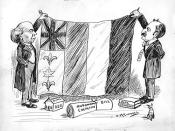Of Border Stories
Trying to write or define the Canadian novel has been a daunting task for many writers. Often facing the limitations and shifting connotations of language the modern writer must create for himself an intellectual foundation from which he can start building his text. Both Fred Wah, in Diamond Grill and Guillermo Verdecchia in Fronteras Amerianas recognize the inadequacy of an English language lacking accurate descriptions for the immigrant, the half-breed and racially impure, and for those intellectually and sentimentally divided. When comparing the two texts, it is evident that they both come to the same conclusion: in order to escape the confines of society that impose a certain vocabulary both on the writer and on the citizen, they have created a new Canadian novel that stresses the freedom of the migrant. Through the use of oxymora and metaphors to describe the indescribable Wah has created "the hyphen" while similarly, Verdecchia has created "the border".
While at first sight these two terms may not seem to represent the same ideals; however, through a close examination it is clear that they both represent the "in-between", the past, present and future, the connection of opposites and the struggle between personal freedom and limitations. Verdecchia seems to articulate more efficiently Wah's struggle that the greatest borders of all are within the individual. Thus, for both Wah and Verdecchia, self-identification becomes both necessary and difficult to achieve when the experience of being Canadian is inherently multiple. As Wah describes it, Diamond Grill is a biotext, a journey into his family's and his own past where he challenges simplistic models of ethnicity and criticizes Canada's concept of multiculturalism. Effectively, with the creation of the hyphen Wah resists assimilation into an all white landscape; he resists the kind of purity in belonging to the...


